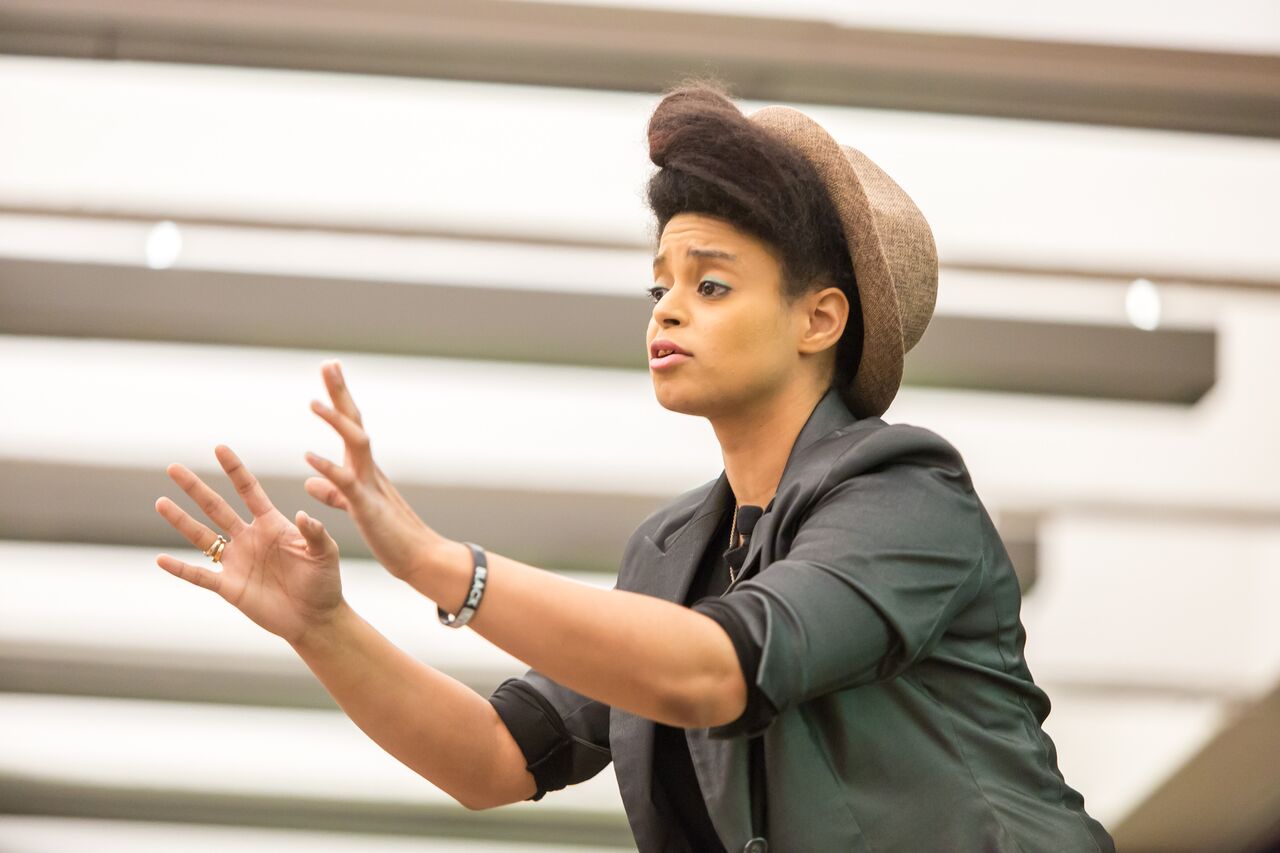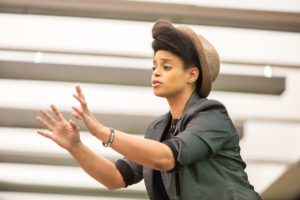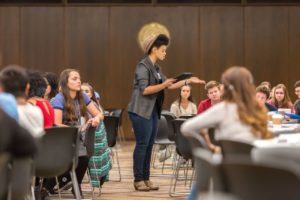


 If you ever find yourself with artist Mojdeh Stoakley, you won’t wait long before hearing her utter, “and all the things,” a phrase that seems to be a cousin of “et cetera.” But “all the things” is a metaphor for Stoakley’s character and the philosophy behind her practice as a member of the Baha’i Faith.
If you ever find yourself with artist Mojdeh Stoakley, you won’t wait long before hearing her utter, “and all the things,” a phrase that seems to be a cousin of “et cetera.” But “all the things” is a metaphor for Stoakley’s character and the philosophy behind her practice as a member of the Baha’i Faith.
Mojdeh Stoakley is an activist, poet, educator, bandleader, entrepreneur, researcher, painter when nobody’s looking, writer, daughter and sister. Through “all the things” she is a Baha‘i, and fervent devotion to each is the way she adheres to her faith.
Being born into a Baha’i family and raised in a majority Christian community led Stoakley to ask many early questions about religion. She spent a part of her adolescence researching many of the world’s faiths to determine whether some of her peers were correct when they asserted that she wasn’t a part of a “real” religion.
She found that few religions openly taught, as the Baha’i Faith does, that men and women are equal, that all races are equal, or that there should be a balance between science and religion. Whether by community or family culture, or personal worldview, she decided that these seemed to be the kinds of universal truths that couldn’t be argued.
Stoakley has blazed her own path in nearly every aspect of her life. She withdrew from public high school at the end of her freshman year to homeschool herself, and graduated two years ahead of her peers.
She studied at the College of DuPage, and was accepted to the School of the Art Institute of Chicago. In 2008, she arranged to forgo her final exhibit for her Bachelor of Fine Arts degree to instead launch Lethal Poetry Inc., a for-profit business designed to support nonprofit organizations.
During its time, Lethal Poetry successfully created cross-discipline arts initiatives that were used to break down barriers that previously confined artists to their respective scenes.
“I have this idealistic belief that the populations with the greatest ability to make social change are artists, educators, and people who own their businesses,” said Stoakley. “If we’re talking about artists as pillars of potential for social change, shouldn’t all of them be talking to each other? Every single one of our initiatives incorporated some sort of creative community fusion.”
For the five years of its existence, Lethal Poetry hosted more than 300 events composed of one-off shows, showcases and festivals. Its main monthly event, Words That Kill, was a poetry and comedy showcase that benefited a local women’s shelter.
Stoakley, whose parents met in Ghana and married in Sierra Leone, was raised in an interracial family (her mother is Persian and her father is African-American) with a strong tradition of service and active involvement in the Baha’i community.
“I like the idea of being of service all the time. That sounds awesome! But how do I also pay my bills, how do I also care for myself and care for my parents as they get older, and contribute to my brother’s career and things like that as we get older? It occurred to me that if I just embed the Faith into my decision-making throughout my career, then I could really do those things in a much more holistic way,” said Stoakley.
As far as service goes, Stoakley’s most impactful responsibility might be her role as an educator, implementing writing, performance, and HIV prevention workshops for youth and children, who she refers to as “kiddos.”


“I never expected to be an educator. As an artist when someone offers you a freelance position that is even remotely related to any of the things you do—even if you don’t know if you can do it—you’re like, “Absolutely! No problem! I can totally do that,’” said Stoakley.
She strives to have her workshop conversations challenge social and emotional issues; weaving principles of the Baha’i Faith into her work in order to combat harmful prejudices, misogyny and the effects of personal and community violence. Through her work Stoakley believes she is fulfilling her creative, spiritual and professional needs.
“As Baha’is we’re actually called upon in the Writings to have some kind of profession that serves humanity … even if it’s to be a cashier or a dog walker or whatever. Regardless of our economic status we’re supposed to have some kind of work; work is considered a form of worship. That’s been in my mind for all of my formative years,” said Stoakley.
“If work is worship, and engaging in the arts is a form of prayer—if I can ‘work’ in prayer—that’s great! So it’s kind of exciting to be an artist who is spiritual—at least from the perspective of the Baha’i Writings, because I’m enacting my connection with God every time I create.”
Stoakley focuses on sharing her Faith through action. “I have more conversations with individuals about the Faith than I ever did when I was very straightforward about saying, ‘I’m doing this thing because I’m a Baha’i; a Baha’i musician, a Baha’i whatever.’ I’ve found it much more meaningful to just be good,” she said.
Stoakley’s current projects involve the Interfaith Poets, a touring ensemble that aims to promote unity in diversity while also creating healthy frameworks for people of different faiths to understand each other. She’s finishing a new album with her band »radiant devices«, is a teaching artist who brings enrichment programs into schools for Chicago Slam Works, and is also a board member for Surviving the Mic, an organization that seeks to nurture safe spaces within arts communities for victims of sexual and domestic violence.
by Troy Brundidge


![]()
![]()
Whether you are exploring the Bahá'í Faith or looking to become an active member, there are various ways you can connect with our community.
Please ensure that all the Required Fields* are completed before submitting.